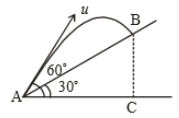A projectile is given an initial velocity of . The cartesian equation of its path is (g = 10 )
1.
2.
3.
4.
A ship A is moving westwards with a speed of 10 km and a ship B, 100 km south of A is moving northwards with a speed of 10 km . The time after which the distance between them becomes the shortest, is:
1. 5 hr
2. hr
3. hr
4. 0 hr
Time taken by the projectile to reach from A to B is t. Then the distance AB is equal to :


1.
2.
3.
4. 2ut
A particle projected with kinetic energy with an angle of projection . Then the variation of kinetic K with vertical displacement y is
1. linear
2. parabolic
3. hyperbolic
4. periodic
A river is flowing with a speed of 1 km/hr. A swimmer wants to go to point 'C' starting from 'A'. He swims with a speed of 5 km/hr, at an angle with respect to the river. If \(\text {AB = BC = 400 m}\). Then

1. The time taken by the man is 12 min
2. The time taken by the man is 8 min
3. The value of is 45
4. The value of is 53
A body is thrown horizontally with a velocity \(\sqrt{2 g h}\) from the top of a tower of height \(h\). It strikes the level ground through the foot of the tower at a distance \(x\) from the tower. The value of \(x\) is:
| 1. | \( h \) | 2. | \(\frac{h}{2} \) |
| 3. | \(2 h \) | 4. | \( \frac{2 h}{3}\) |
Two men \(P\) and \(Q\) are standing at corners \(A\) and \(B\) of a square \(ABCD\) of side \(8~\text m.\) They start moving along the track with a constant speed \(2~\text{m/s}\) and \(10~\text {m/s}\) respectively. The time when they will meet for the first time is equal to:

1. \(2~\text{sec}\)
2. \(3~\text{sec}\)
3. \(1~\text{sec}\)
4. \(6~\text{sec}\)
A particle starts from the origin at t=0 and moves in the x-y plane with constant acceleration 'a' in the y direction. Its equation of motion is . The x component of its velocity (at t=0) is:
1. variable
2.
3.
4.
A body is projected with a velocity \(u\) with an angle of projection \(\theta.\) The change in velocity after the time \((t)\) from the time of projection will be:
| 1. | \(gt\) | 2. | \(\frac{1}{2}gt^2\) |
| 3. | \(u\sin\theta\) | 4. | \(u\cos\theta\) |
What determines the nature of the path followed by the particle?
1. Speed only
2. Velocity only
3. Acceleration only
4. None of these






